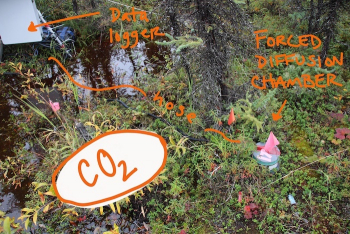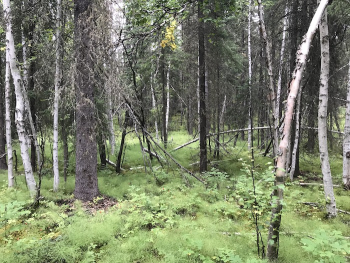What Are They Doing?

Where Are They?

Latest Journals

Dr. Jennifer Watts grew up in northern landscapes and feels a personal connection to the places and ecosystems she studies. She is interested in patterns and mechanisms of change in terrestrial environments, particularly the tundra, wetlands and forests in the Arctic-boreal regions of Alaska and Canada. She is also very fond of the semi-arid grasslands in the Rocky Mountain West. Her work draws on remote sensing, carbon flux measurements, hydrology and ecosystem modeling to understand how climate change and human disturbance are affecting vegetation and soils and ultimately, the carbon cycle.

Howard Epstein is Professor and Chair of the Department of Environmental Sciences at the University of Virginia, specializing in the ecology of arctic tundra, dry grasslands and shrublands, and temperate forests. His research focus is on vegetation dynamics, nutrient cycling, and plant-soil-atmosphere interactions. Dr. Epstein received his B.A. degree in Computer Science from Cornell University in 1986. He received an M.S. degree in Rangeland Ecosystem Science from Colorado State University in 1995 and a Ph.D. in Ecology from Colorado State in 1997. He conducted postdoctoral studies at the Institute of Arctic and Alpine Research at the University of Colorado. Dr. Epstein came to the faculty of the University of Virginia in 1998. He teaches courses in the Fundamentals of Ecology, Terrestrial Ecology, and Ecology of Grasslands and Tundra. He has published ~175 peer-reviewed journal articles and book chapters. He led the annual production of the Tundra Greenness essay for the NOAA Arctic Report Card from 2012-2018, and he has contributed to several international reports, including the 2019 IPCC Special Report on the Ocean and the Cryosphere. He served on the Board of Directors for the Arctic Research Consortium of the U.S. from 2013-2019. He has regularly traveled to the Alaskan, Canadian, and Russian Arctic for field research.

Xi Yang is an assistant professor in the Department of Environmental Sciences at the University of Virginia. He designed an instrument to measure the fluorescence emitted by plants during photosynthesis. In this project, the team will use this instrument to monitor photosynthesis by evergreen and deciduous trees.

Wayne grew up in a rural, forested southern Virginia and has had a personal connection to nature since childhood. He is interested in understanding how terrestrial photosynthesis functions in harsh northern ecosystems, particularly forests in the boreal regions of Alaska. In particular, he is focused on better understanding how plants decide when to start photosynthesizing as you move from Winter to Spring and how this timing may change under climate change. His work primarily uses remote sensing, ecosystem flux measurements, and environmental monitoring to capture the full picture of how these ecosystems are changing and how these changes are affecting plants and, more broadly, the carbon cycle.

Jonas grew up in the town of Homer, Alaska. His work is dedicated to understanding threats to the Alaskan ecosystems he calls home. Jonas has a B.S. in Biology from Swarthmore College and plans to pursue a graduate degree to study the ecological effects of climate change in the boreal forest. He has worked as an interpreter, field technician and land steward in nature reserves across the western US.

Dr Parazoo is a Scientist in the Carbon Cycle and Ecosystems group at the Jet Propulsion Laboratory. His research focuses on an improved understanding of planetary ecosystem metabolism, the impact of climate change on carbon uptake by plants, and the feedbacks of changing ecosystem function to global climate. His PhD and Postdoc used aircraft and satellite observations with carbon models to quantify CO2 exchanges between land and atmosphere, and track CO2 movement through cloudy weather systems. His current research focuses on the use of remote sensing observations with land surface and atmospheric models to study terrestrial carbon climate feedbacks across natural and developed regions, including the Arctic, tropics, and megacities.

Ms. Kathleen Savage works in Woodwell Climate’s Arctic Boreal program. Her primary research focus is on the impacts of climate change on greenhouse gas (CO2, CH4, N2O) exchange in northern forest and wetland ecosystems. She had developed methodologies for continuous measurement of greenhouse gas fluxes, data quality protocols and taught those techniques to other scientists and students. One of her current projects involves investigating a novel approach to in situ quantification of CH4 oxidation in soils at the Howland Forest in Maine.
Ms. Savage obtained her B.Sc. at York University in Toronto and M.Sc. at McGill in Montreal.

